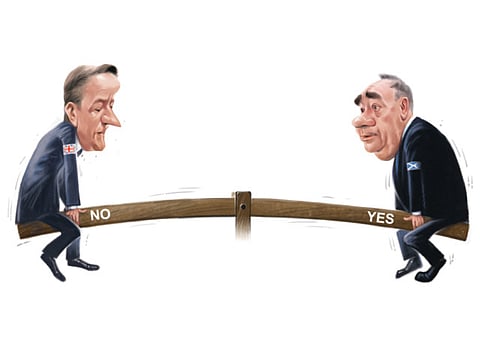Britain needs more devolution and true local autonomy
English regions deserve more control over their politics and they must take back power from Westminster-appointed quangos

Today Scotland votes and tomorrow we will know if the United Kingdom will survive or will have to change. The vote will be close and there is a real danger that the passion on both sides that have come to the fore in the last few weeks will merge into bitter recrimination and hatred. That would be a disaster.
Scotland and England have had an intimate relationship for centuries, and there is much that they both share and should continue to do so. As one country they have both contributed to building the tolerant and open society based on the rule of law that is the particular glory of Britain. That should continue whatever happens.
Of course, this intimate relationship has had problems, which is why we have come to this desperate pass today. The much smaller Scotland has always been determined not to be swallowed by the arrogance of the much larger England. It is also a problem that England does not have much of its own conscious national identity and therefore its emotions have become closely entwined into the United Kingdom, making the union less a partnership of equal parts and with more domination from the centre.
This is why the manipulative Alex Salmond has been able to engage so successfully with Scottish emotions. Scots are naturally angry with the inward-looking politicians in Westminster. Salmond has succeeded in confusing the need to drag the London–based politicians out of their comfort-zone with the need for complete independence.
Salmond has been helped a lot by the miserable performance of Prime Minister David Cameron and other Westminster party leaders who ignored the passionate debate north of the border until two weeks ago when a sense of panic descended on Westminster. The patronising last minute rush to take part accompanied by silly gimmicks like flying the saltire on 10 Downing Street would have infuriated any nationalist, and also infected any supporter of the union as well.
Whatever the result tomorrow morning, the crude manipulation of the electoral rules by Salmond does not bode well for his future credibility. Anyone who can fiddle the law to seek his own advantage erodes people’s trust in his good intentions. It does not speak well for his long-term political future. Salmond feared that the nationalists would lose a normal election so he changed the rules, and for the only time in British history has allowed 16 and 17-year-olds to have a vote, working on the patronising assumption that they are more impressionable to nationalist emotions than the older generations. In addition, well aware that expatriate Scots are more international in outlook that their stay-at-home cousins, he banned Scots who are living outside Scotland from voting, so a Scottish accountant posted to Newcastle or London by his employer has no vote. But Salmond has allowed the several hundreds of thousands of English resident in Scotland to have a vote, as well as the 120,000 EU citizens resident in Scotland.
Over-centralised management
It is deeply irritating for many all over Britain that the Scots have got themselves into the position of being able to vote on Westminster’s arrogance while the rest of the UK cannot express its anger at the over-centralised management of the country. One of the best effects of the current debate is that devolution and local autonomy is finally a major political issue. While Scotland, Northern Ireland and Wales have regional assemblies, the rest of the country suffers under administration by country councils which are far too small to be able to make very much difference, and have been forced to surrender their powers to the London-based ministries.
Growing up in Hampshire, this was brought home to me when Winchester City Council wanted to put a zebra crossing over a particular road so that school children could cross safely. Because that street close to the city centre led onto a main road it had been designated an ‘A’ Road and therefore the City Council had no authority to put in the zebra crossing, and had to plead with the bureaucrats in Whitehall’s Ministry of Transport to make the change. Ending this hopeless over-control from Whitehall is Britain’s major challenge.
Over the years the counties have proved to be too small for modern government, and vast areas of government responsibility formally controlled by county councils have drifted off to be managed by regional boards, such as hospitals, water, police and even education in some areas. These boards and quangos have members appointed by the London ministries, and therefore they are grace and favour positions that owe nothing to local sentiment or voters, but greatly expand ministers’ powers of patronage.
The answer is to set up regions across all England with their own assemblies, giving the people of North England, the West Country, London, the Home Counties and the Midlands some say over their affairs, just as the people of Scotland, Northern Ireland and Wales have had for some years. Britain needs to stay one country, but Westminster needs to unleash the power of Britain’s regions and celebrate its diversity rather than throttle it. If the Scottish vote can start such a process some good will come of it.


